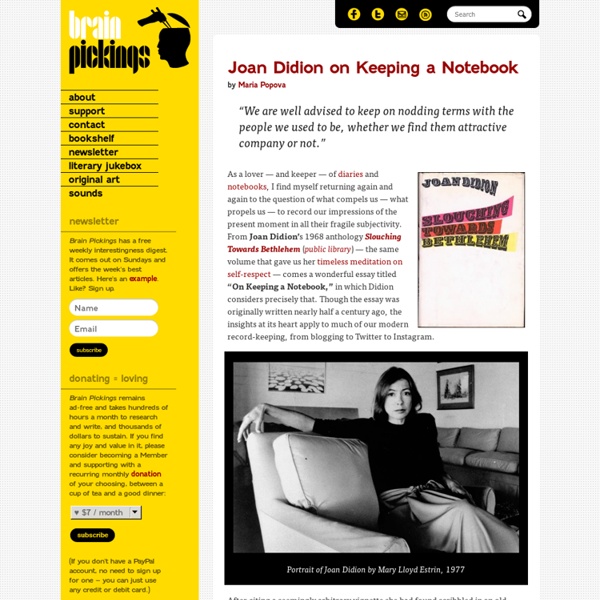Joan Didion on Self-Respect
For the past half-century, Joan Didion (b. December 5, 1934) has been dissecting the complexities of cultural chaos with equal parts elegant anxiety, keen criticism, and moral imagination. The dismal fact is that self-respect has nothing to do with the approval of others — who are, after all, deceived easily enough; has nothing to do with reputation, which, as Rhett Butler told Scarlett O’Hara, is something people with courage can do without.To do without self-respect, on the other hand, is to be an unwilling audience of one to an interminable documentary that deals with one’s failings, both real and imagined, with fresh footage spliced in for every screening. There’s the glass you broke in anger, there’s the hurt on X’s face; watch now, this next scene, the night Y came back from Houston, see how you muff this one.
Frank Kermode · Writing about Shakespeare has his say · LRB 9 December 1999
Fifty-odd years ago I was asked to review a book about Shakespeare by an aged professor who claimed that a career spent largely in teaching Shakespeare gave him a right to have his final say on the subject. This notion I thought grossly self-indulgent. There seemed to be little reason to believe that at his age he could suddenly have found anything interesting to say. And there surely were enough books on Shakespeare already, many of them dull, many of them silly, without the addition of another of which the primary motive was vanity and an understandable fear of oblivion. My editor, detecting a breach of decorum, declined to publish my review. I thought this deference cowardly; I have now changed my opinion.
6 Things {Sexy Consciously Awake} Women Want From Sex
About Me I am a lover of words and all things true. I am an awake women who will not be held down. I am here to do great things for what other reason is there to live and breathe. “If you want to be the kind of lover women never forget, then it’s time to seriously educate yourself on the art of sex. An erection is not enough to make us feel the depth of your energetic being as a man, nor to connect us to higher planes.”
Digital and Paper Diaries Are Written for an Imagined Audience - Room for Debate
“I have tried to keep diaries before but they didn’t work out because of the necessity to be honest.” John Steinbeck made this entry in a ledger he used to track his progress on "The Grapes of Wrath." If we pine for a golden age of diary keeping, let’s indeed be honest: the pens and notebooks of the past inspired a truth no more — and no less — pure than the digital tools of today.
How to Get Out of Your Own Way and Unblock the “Spiritual Electricity” of Creative Flow
by Maria Popova “No matter what your age or your life path … it is not too late or too egotistical or too selfish or too silly to work on your creativity.” “Art is not a thing — it is a way,” Elbert Hubbard wrote in 1908. But the question of what that way is, where exactly it leads, and how to best follow it is something artists have been grappling with since the dawn of recorded time and psychologists have spent decades trying to decode, outlining the stages of creativity, its essential conditions, and the best technique for producing ideas.
I Know Why the Caged Bird Sings
Cover from the first edition of I Know Why the Caged Bird Sings (1969) I Know Why the Caged Bird Sings is the 1969 autobiography about the early years of African-American writer and poet Maya Angelou. The first in a seven-volume series, it is a coming-of-age story that illustrates how strength of character and a love of literature can help overcome racism and trauma. The book begins when three-year-old Maya and her older brother are sent to Stamps, Arkansas, to live with their grandmother and ends when Maya becomes a mother at the age of 16.
Excerpt: 'The Book of Genesis: A Biography' by Ronald Hendel
Noah’s Offering, Francesco Castiglione, 17th C From The Comedy of the Real: One honest response to the lunacy of the world is to laugh. Laughter relieves anxiety and fear, and it pokes holes in the pretensions of the powerful.
Children of Hags: photographer captures heterochromians with different-coloured eyes – Llamas' Valley
By Llamas' Valley | “Heterochromia – Children of Hags” is a conceptual photography project by Amsterdam based Lithuanian photographer and Llamas’ Valley contributor Maria Cavali. The photographer keeps looking for people who have differently coloured eyes and photographs them. The project started as a conceptual idea of an identity project.



